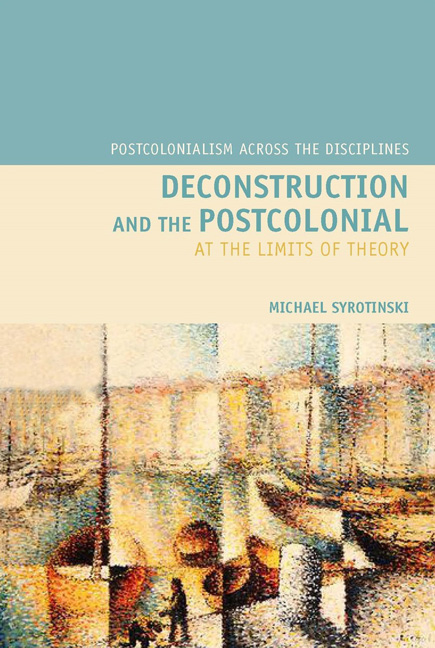Book contents
- Frontmatter
- Dedication
- Contents
- Acknowledgements
- Introduction: a few liminal remarks
- Part I Postcolonial deconstruction
- 1 Deconstruction in Algeria (Derrida ‘himself’)
- 2 Hybridity revisited
- 3 Spivak reading Derrida: an interesting exchange
- Part II Deconstruction and postcolonial Africa
- Conclusion (Postcolonial Blanchot?)
- Bibliography
- Index
1 - Deconstruction in Algeria (Derrida ‘himself’)
from Part I - Postcolonial deconstruction
- Frontmatter
- Dedication
- Contents
- Acknowledgements
- Introduction: a few liminal remarks
- Part I Postcolonial deconstruction
- 1 Deconstruction in Algeria (Derrida ‘himself’)
- 2 Hybridity revisited
- 3 Spivak reading Derrida: an interesting exchange
- Part II Deconstruction and postcolonial Africa
- Conclusion (Postcolonial Blanchot?)
- Bibliography
- Index
Summary
In a series of books and essays beginning with his groundbreaking study White Mythologies: Writing History and the West (1990), Robert Young has been a leading critic in debates on the relationship of deconstruction to postcolonial theory. Young offers in a more recent essay, ‘Deconstruction and the postcolonial’ (2000), a strong critique of materialist postcolonial theorists who dismiss deconstruction on the grounds of its alleged ‘textualist’ bias. In particular, he challenges what he sees as Aijaz Ahmad's rather crude and dogmatic account of the linear progression of French theory (a narrative according to which ‘poststructuralism’ has no significance or relevance for political theory, or indeed any other postcolonial concerns). What Young refers to, with some irony, as Ahmad's ‘endearing personalism’ is well observed, not just because Young is in the position of having to take it personally (he happens to be one of the critics at whom Ahmad directs much of his intellectual hostility), but also because the version of intellectual history we are given in Ahmad's book In Theory indeed resembles a morality play of sorts, with a cast of larger-than-life figures strutting across the stage. The point that Young (p. 190) is making, though, is that Ahmad refuses to actually read the texts of the theorists he caricatures, but reduces them to a set of themes and critical stereotypes, which allows him to conflate his anti-poststructuralist stance with the ‘common anti-postcolonial trope’ of assuming that postcolonial theory can be a product only of the First World.
How are we to take Young's own strong postcolonial reading of deconstruction, then? In ‘Deconstruction and the postcolonial’, Young reaffirms the argument he first advanced in White Mythologies, namely that Jacques Derrida's work has always, even if somewhat indirectly, challenged the ethico-political tensions at the heart of colonialist ideology. The beginning and end of Young's essay is written as a second-person singular address to Derrida, almost in the form of a personal letter, and this rhetorical intimacy is clearly intended to emphasize the close affinity Young sees between their respective projects, which is the essence of his explicit argument. Young's essay thus resituates Derrida's work within a postcolonial theoretical framework (and, from the outset, an anticolonial one) by showing that, from the very opening lines in Of Grammatology, Derrida's long, meticulous analysis of the discursive privileging of speech over writing in the Western metaphysical tradition is relayed through a critique of ethnocentrism.
- Type
- Chapter
- Information
- Deconstruction and the PostcolonialAt the Limits of Theory, pp. 11 - 25Publisher: Liverpool University PressPrint publication year: 2007

